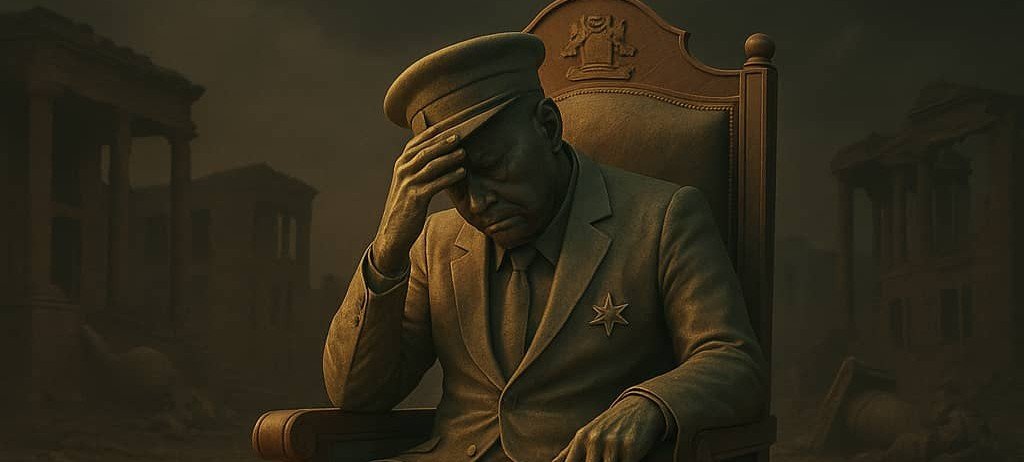By Isaac Christopher Lubogo
I. Prologue: The Throne as a Cross
Power is seductive not because it gives, but because it transforms. To ascend politically in certain African and global contexts is not merely to govern—it is to transubstantiate into a semi-deity. The hand that once begged for votes now blesses. The mouth that once pleaded now declares. And the man who once lived among men is now carried like a relic, guarded like a prophet, worshipped like a god.
But what happens when such a person is told to step down?
“He who has once been intoxicated with power, can never willingly return to submission.”
—Edmund Burke
II. Political Power as Apotheosis: The Birth of False Gods
Politics, especially in fragile democracies and personality cults, tends to deify its holders. The leader is not just respected; he is feared. Not just admired; he is mythologized. Over time, state power fuses with personal identity until losing office becomes akin to death—not metaphorically, but existentially.
This is why, as Nietzsche warned,
> “Whoever fights monsters should see to it that in the process he does not become a monster. And if you gaze long enough into the abyss, the abyss will gaze back into you.”
The man who once fought tyranny becomes tyranny. The liberator becomes the jailer. And worse still—he knows it, but cannot undo it.
III. The Fear of Being Mortal Again
The dread that grips a long-reigning leader when talks of transition arise is not simply about retirement—it is the fear of becoming irrelevant.
Let us reflect on what that man loses:
The motorcade that stops traffic as he passes.
The phone calls that never go unanswered.
The newspapers that quote his every cough.
The armed guards that separate him from accountability.
The young people who chant his name for bread, not belief.
To lose these is not to go back to civilian life. It is to die a slow, humiliating, anonymous death. It is to realize that the god was only a man in borrowed robes.
IV. The Stigma of the Former
There is no title more cursed in such environments than “former.”
Former president.
Former hero.
Former liberator.
Former lion.
In the African context, the moment one steps down, the files begin to open, the friends begin to disappear, and the very institutions that once sang hymns begin to hum dirges.
> “Power is not only what you have but what the enemy thinks you have.”
—Saul Alinsky
And so, to protect even the illusion of power, some will sell everything—their dignity, their beliefs, their nation, even their soul.
V. The Economics of Ego and Entitlement
There are certain freedoms attached to power that no human, once drunk on them, relinquishes easily:
The freedom not to answer questions.
The freedom to command others’ time, money, and loyalty.
The freedom to rewrite history, even as it unfolds.
The freedom to make mistakes and be applauded anyway.
The freedom to be immune from poverty, sickness, and shame.
These freedoms are intoxicating because they simulate divinity—but they are also the chains that keep many from stepping down.
> “It is much safer to be feared than loved, when, of the two, either must be dispensed with.”
—Niccolò Machiavelli
VI. Practical Case Studies: Gods Who Refused to Bleed
1. Muammar Gaddafi (Libya) – Clung to power under the illusion of immortality, only to die in a sewer pipe, bloodied and humiliated by the very people who once sang songs in his name.
2. Robert Mugabe (Zimbabwe) – Declared himself “the only one who could rule Zimbabwe,” only to be ousted in old age, shuffled quietly into the background of a nation he once commanded like a messiah.
3. Idi Amin (Uganda) – Once claimed divine insight and invincibility. When the winds turned, he fled like a man, not a god, dying a shadow in Saudi Arabia.
Each of these men chose the illusion of eternity over the dignity of departure. And each paid a price.
VII. The Tragedy of Eternal Incumbency: From Messiah to Monster
There is a moment in the political life of a leader when applause becomes performance, and loyalty becomes fear. He stops seeing the people as citizens and starts seeing them as subjects.
At this moment, power no longer serves the nation. It consumes it.
> “Nearly all men can stand adversity, but if you want to test a man’s character, give him power.”
—Abraham Lincoln
Those who fail this test lose not just their character—but their legacy.
VIII. Conclusion: The Liberation of Letting Go
True leadership is measured not by how long you hold power, but by how gracefully you release it. The one who steps down voluntarily becomes greater than the one who died clinging to it.
> “He who controls others may be powerful, but he who has mastered himself is mightier still.”
—Lao Tzu
The god who surrenders the altar to build temples of freedom is the one history will remember—not as a tyrant, but as a titan.
To those who fear losing power:
You were never the god. You were the man entrusted to serve. And what you do next determines whether the people will remember you with fear—or with gratitude.
Epilogue:
Let every throne bear a mirror. So that when the applause fades, the leader can see not the mask of worship, but the face of a man—mortal, flawed, and desperately in need of grace.
Signed,
Isaac Christopher Lubogo
Thinker, Son of the Soil, and Watchman of the Withering Conscience
# Suigeneris








